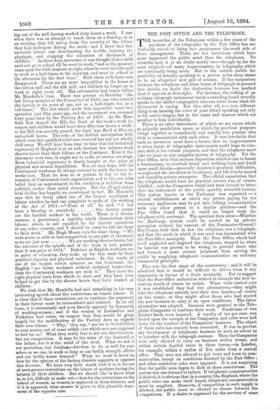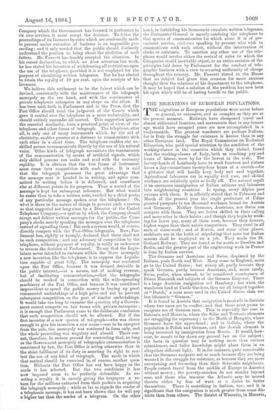an evening, they fell asleep from the severity of the
labour HE invention of the Telephone within a few years of the
THE
of the telegraphs by the Post Office has un- excessive labour was deteriorating the health, injuring the doubtedly served to bring into prominence the weak side of State management. There are few inventions which have between the telephone and other forms of telegraph is pursued the cotton mill and the silk mill, and children no longer go to i
,work at eight years old. The reformation had begun before into details, no doubt the distinction becomes less marked Mr. Mundella's time. There was present on Saturday " the than it appears at first-sight. For instance, the ticking of an ordinary telegraph instrument inside a sounding-board actually last living member of the Committee of 1833, one who entered
s the factory at six years of age, not as a half-timer, but as a speaks to the skilled telegraphist who can write down what the full-timer." The Act which made this impossible came into instrument is saying. But this, after all, is a very different thing from hearing the voice of your friend speaking not only operation just fifty years ago, and the movement was crowned in his native tongue, but in the tones and manner which are women and children would have been fifty-four hours a week ; There is no other instrument of which we are aware which as the Bill was actually passed, the limit was fixed at fifty-six so palpably annihilates space, or which for practical purposes and-a-half hours. The echo of the doleful anticipation with brings together so immediately and rapidly two persons who which even this qualified relief was received has not yet wholly wish to communicate with each other. It was inevitable that died away. We still hear from time to time that the industrial such an invention must have a future, that no improvements i supremacy of England is at an end, because her artisans work in other forms of telegraphic instruments could hope to corn- shorter hours than their fellows on the Continent. Even if the Pete with it for certain purposes, and that the telephone must statement were true, it ought not to make us retrace our steps. take its place in any complete system of telegraphy. Yet the Even industrial supremacy is dearly bought at the price of Post Office, with that curious disposition which seems to haunt physical and mental degradation. Nor, we may hope, will the a bureaucracy, to overlook broad and striking facts and dwell Continental workman be always content to work the hours he upon small details,—generally christened practical difficulties, works now. That he does so at present is due to the in- —neglected the invention in its infancy, and left it to be nursed and reared by private enterprise. The official expectation that feriority of Continental trade organisation and to his own false belief that an improvement in his condition is to follow from the telephone would have no practical success was, of course, political, rather than social changes. But the alleged indus-
falsified ; and the Companies which had been formed to intro- trial decline has happily no counterpart in fact. Mr. Mundella duce the instrument to the public speedily attracted custom. says that he lately asked one of the largest employers of The system known as the Exchange was organised — a labour whether he had any complaint to make of the working central establishment at which any person paying for the of the Act of 1874 :—" None at all," he said, " it has necessary appliances may be put into talking communication been a blessing to everybody Our factory people with any other person in a similar position—and the _ Post Office found that it could no longer treat the are the hardest workers in the world. There is a strenu
ousness, a persistency, a rapidity which characterises their telephone with contempt. The question then arose—Whether labour, which is not equalled by the factory operatives the Exchange system could be carried on by private of any other country, and I should be sorry to add one hour enterprise without the consent of the Postmaster-General ? to their work." Mr. Hugh Mason says the same thing. " We The Courts held that in law the telephone was a telegraph, were never so able to face competition in any part of the world and that the mode in which it was used was inconsistent with
competitors. If a desire is expressed for the services of some
Company which the Government has licensed in preference to its own services, it must accept the decision. To fetter the proceedings of its licencees by rules which are confessedly made to prevent undue extension of business is an impossible pro- ceeding; and it only needed that the public should distinctly understand the position to bring about the abolition of such fetters. Mr. Fawcett has frankly accepted the situation. In his recent declaration, to which we drew attention last week, he has stated his intention of withdrawing all restrictions upon the use of the telephone, provided it is not employed for the purpose of circulating written telegrams. But he has elected to retain the royalty of 10 per cent. upon the receipts of his licencees.
We believe this settlement to be the fairest which can be devised, consistently with the maintenance of the telegraph monopoly on the one hand, and with the continuance of private telephonic enterprise in any shape on the other. It has been said, both in Parliament and in the Press, that the Post Office should treat the judgment of the Courts which gave it control over the telephone as a mere technicality, and should entirely surrender all control. This suggestion ignores the essential similarity, from a practical point of view, of the telephone and other forms of telegraph. The telephone, after all, is only one of many instruments which, by the aid of electricity, enables persons at a distance to communicate with each other in a short time. The telephone enables any un- skilled person to communicate directly by the use of his natural voice. Other kinds of telegraph necessitate the transmission of the communication by means of artificial signals, which only skilled persons can make and read with the necessary rapidity. It is obvious that the two forms of instrument must come into competition with each other. It is said that the telegraph possesses the great advantage that the message sent is handed in in writing, and again com- mitted to writing before it is delivered, and sometimes also at different points in its progress. Thus a record of the message is kept for subsequent reference. But what would be easier than to take a written note, verified by a third party, of any particular message spoken over the telephone ? Or, what is there in the nature of things to prevent such a system as that suggested not long since by a Director of the United Telephone Company,—a system by which the Company should accept and deliver written messages for the public, the Com- pany's clerks merely speaking the messages over the telephone instead of signalling them ? But such a system would, of course, directly compete with the Post-Office telegraphs. Now, Par- liament has, rightly or wrongly, declared that there shall not be such competition ; and any advocacy of competition by the telephone, without payment of royalty, is really an endeavour to reverse the decision of Parliament. To say that the Legis- lature never intended to embrace within the State monopoly a new invention like the telephone, is to suppose the Legisla- ture capable of great folly. The monopoly was conferred upon the Post Office, because it was deemed desirable in the public interest,—as a means, not of making revenue, but of facilitating communication,—that the telegraphs should be worked in connection with the wide-spreading machinery of the Post Office, and because it was considered improvident to spend the public money in buying up great commercial undertakings at a high price and not to prevent subsequent competition on the part of similar undertakings. It would take too long to examine the question why a Govern- ment cannot compete on fair terms with private enterprise ; it is enough that Parliament came to the deliberate conclusion that such competition should not be allowed. But if the first inventor of a new species of telegraph—who was clever enough to give his invention a new name—was to be excepted from the rule, the monopoly was conferred in form only, and the whole proceeding was nugatory and absurd. There can- not, therefore, be serious ground for contending that, so long as the Government monopoly of telegraphic communication is sanctioned by law, the Post Office is acting otherwise than in the strict fulfilment of its duty in asserting its right to con- trol the use of any kind of telegraph. The mode in which that control should be exercised is, of course, another ques- tion. Hitherto the Post Office has not been happy in the mode it has selected. But the two conditions it has now imposed seem to be perfectly defensible. In ex- acting a royalty it is merely giving the taxpayers a re- turn for the millions extracted from their pockets in acquiring the telegraph monopoly ; while so far as regards the sender of a telephonic message, it has not been shown that he will pay a higher tax than the sender of a telegram. On the other
hand, in forbidding his licencees io circulate written telegrams, the Postmaster-General is merely confining the telephone to that species of communication for which alone it is of pre- eminent service, vied-voce speaking by persons who wish to communicate with each other, without the intervention of clerks or assistants. To sanction any other use of the tele- phone would involve either the revival of rules to which the Companies would inevitably object, or an entire revision of the principles laid down by Parliament for the conduct of tele- graphic business with a view to securing uniformity of charge throughout the country. Mr. Fawcett stated in the House that no subject had given him occasion for more anxious thought than the relations of his department to the telephone. It may be hoped that a solution of the problem has now been hit upon which will be of lasting benefit to the public.



































 Previous page
Previous page